Armenia-Azerbaijan information war over Karabakh – Baku's take
Fake news about the Karabakh war
Many experts consider the second Karabakh war, which took place in the fall of 2020, to be unprecedented in terms of the scale of propaganda attacks in the information space that accompanied military actions.
Researchers in Yerevan and Baku analyzed the “information war” tools used by the “other side”. Below are the results of a study by an Armenian author in relation to the campaign that was waged by Azerbaijan.
Both publications use terminology and toponymy chosen by the authors.
The armed conflict in the Karabakh zone between the Azerbaijani and Armenian forces lasted 44 days, since September 27, 2020. During this time, at least eight thousand people died on both sides, the search for the missing continues at the time of publication of this article. On November 10, the Presidents of Azerbaijan and Russia and the Prime Minister of Armenia signed an agreement to end hostilities. The agreement included as the main points: the return to Azerbaijan of control over several regions adjacent to Nagorno-Karabakh; bringing Russian peacekeepers into the region; exchange of prisoners and return of refugees.
During the 44-day war in Karabakh in September-November 2020, the information war between Armenia and Azerbaijan was fought no less fiercely.
And while the Azerbaijani authorities were more focused on preventive control (for which they restricted social networks in the country, in particular, by blocking some messengers), then the Armenian authorities, leaving social media free, introduced a criminal article for publishing critical statements about the actions of the authorities and the defense capability of the army.
In the sheer volume of news, it was difficult at that time to distinguish wholly fictional or partly distorted news from true news.
Basically, news (or even specially created pages on social networks) set the following tasks:
- Show convincingly that only one side of the conflict suffered civilian damage. Such fakes are aimed at an international audience.
Scare the enemy with military losses. - This is how the “lists of the dead” appeared in several versions, which the fake “Azerbaijani” media (in fact, made in Armenia) offered the Azerbaijani audience.
- Convince your own society that the enemy is losing. For this, videos and photos of the “running Azerbaijani army” were best suited.
Here are some examples:
1.
This news appeared in the Armenian media, as well as on Telegram channels, on November 8: “As a result of the actions of the Armenian army, the enemy fled from the Berdzor mountains.”
A video of the Armenian Defense Ministry was attached to the news, and it looked like thousands of fakes of this type: in fact, the viewer has no idea where it was filmed, when, by whom, and even who is in this video.
We search by tags in Telegram, or we drive the keywords of the title into a YouTube search, and we find a similar video that was uploaded much earlier. Since the news is about a specific time, to refute it, it is enough to prove that the video was edited from the old one. This is very easy to do if you download both videos and watch them carefully frame by frame.
2.
One of the most famous Armenian fakes is Hamimiz.com (“All of us”). Now it is no longer online, but if you use the Wayback Machine service, http://web.archive.org/, you can see what it was like.
It was assumed that there is a list of the names of the dead Azerbaijani soldiers and a search system. But when people guessed to look for their own names and surnames there, it turned out that any Azerbaijani is listed as dead.
It is believed that, in addition to intimidation, this site was also supposed to collect passport data that people entered when searching.
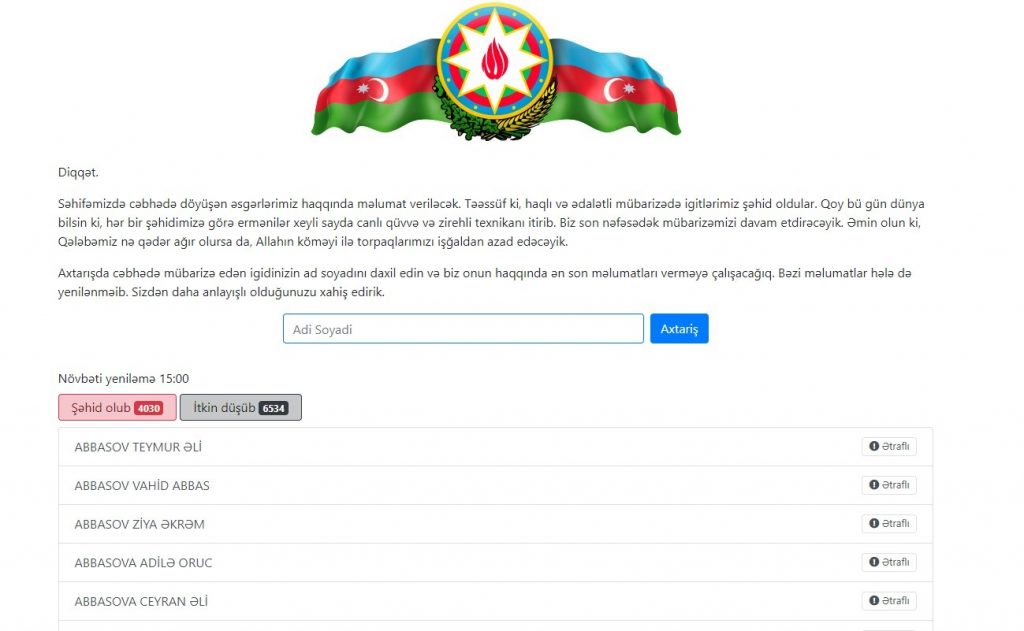
3.
A similar fake news portal Şəhidlər.info, also aimed at an Azerbaijani audience, did provide real information about the deceased military.
Here is the Telegram channel.
The owners of this channel posted information about the dead long before official sources (Azerbaijan made public the names only after the war), while commenting on the news in Azerbaijani in the spirit of “May God rest his soul” or “We are proud of our heroes.” That is, this is not the case when the Armenian media resource simply provides information in the Azerbaijani language, because then the effect would be much less. Not everyone will believe the Armenian media. And Azerbaijani – yes.
And although I could not establish the origin of the telegram channel, there is a copy of it on Facebook.
The last post is an offer of help in finding the dead. Moreover, the number is not Azerbaijani.
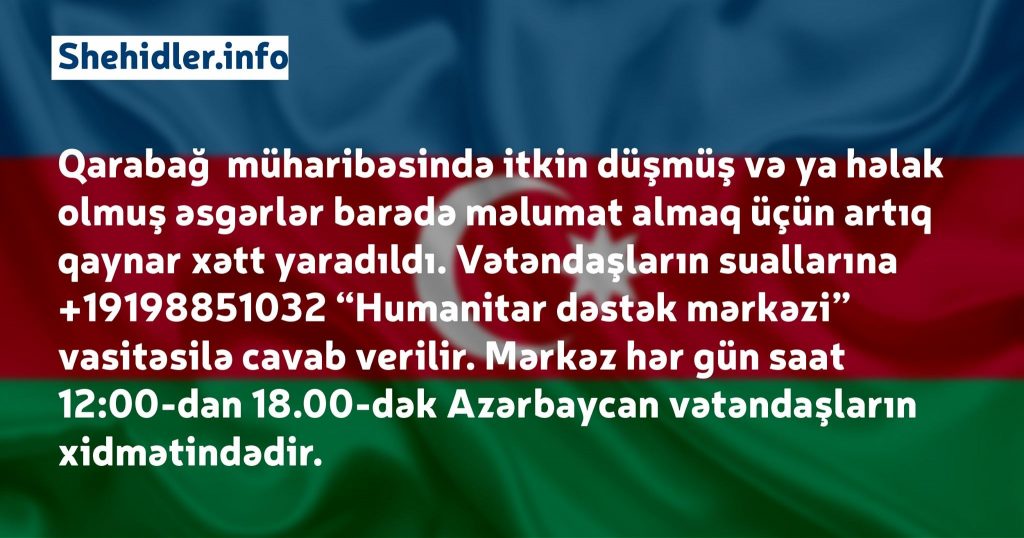
With the “page transparency” function, you can find out where the page was controlled from.

The page has two administrators and both are from Armenia.
4.
The Hərbi Media page (military media) is notable for the fact that it has been operating since 2011.
Its difference from the previous ones is that it appeared not during the war, but much earlier – 2011. And it constantly published information about deceased Azerbaijani soldiers.
During the war, it published daily lists of the dead in this format:
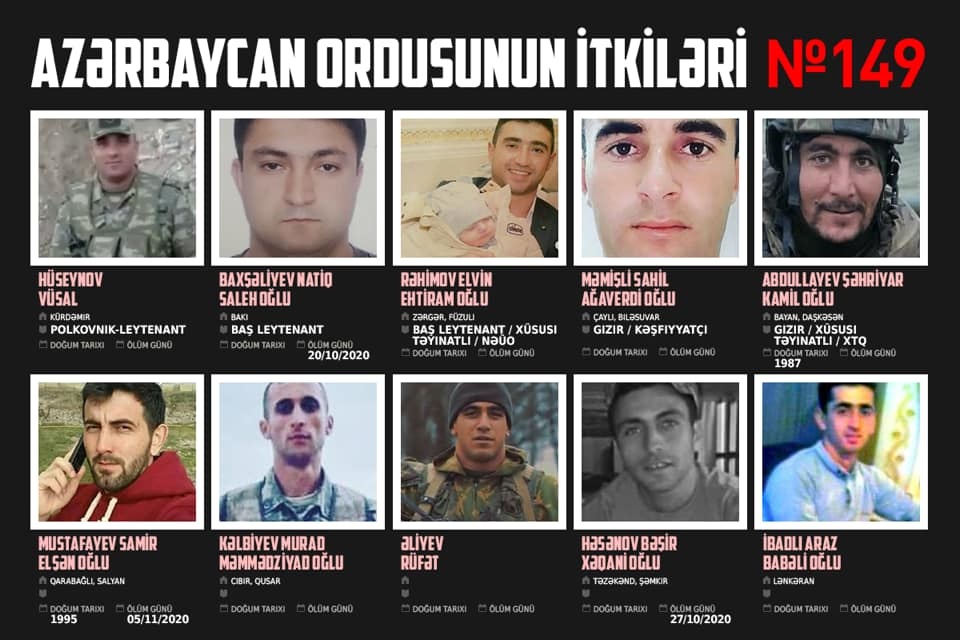
Again, we look at where the administrators are from.
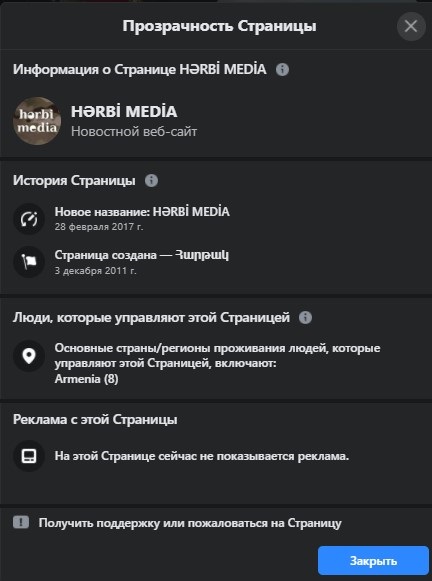
As we can see, besides the fact that it has 8 administrators from Armenia, it was created in 2011 as an Armenian media resource, but changed its purpose in 2017.
Now, after it was proved that they were not Azerbaijani, both pages Şəhidlər.info and Hərbi Media ceased their activities.
5.
“In Artsakh, Arab sheikhs hunt birds,” Armenian outlet asekose.am published this news in March 2021. The information war is still ongoing.
This news, unlike the two previous fakes, is intended for Armenians who are not familiar with what is happening in Azerbaijan.
In fact, this video, although indeed about illegal hunting, was made by the Azerbaijani eco-activist Javid Gara in the north-east of Azerbaijan, from where you have to travel across the country to Karabakh.
In the video on the link, he himself.
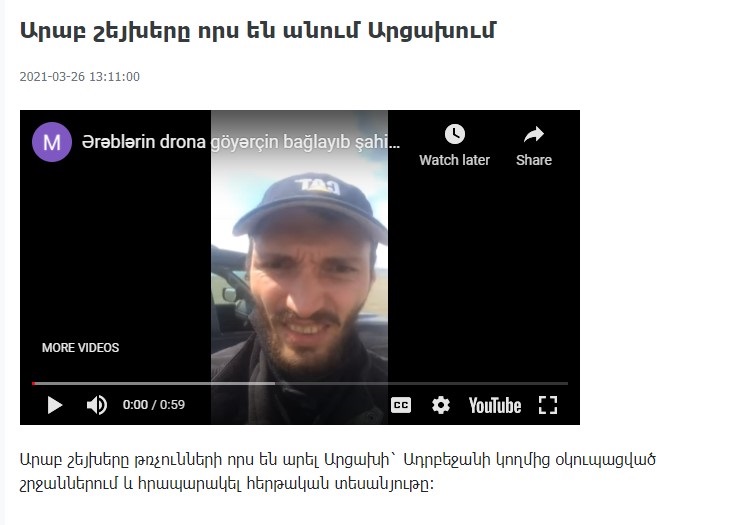
This event – illegal hunting – was so widely discussed and condemned by the Azerbaijani society that even state channels made a report about it.
If something like this happened in Karabakh, neither Javid would be able to get there (since he is not a military man and does not have an entry permit), nor the state media would spread about it.


















